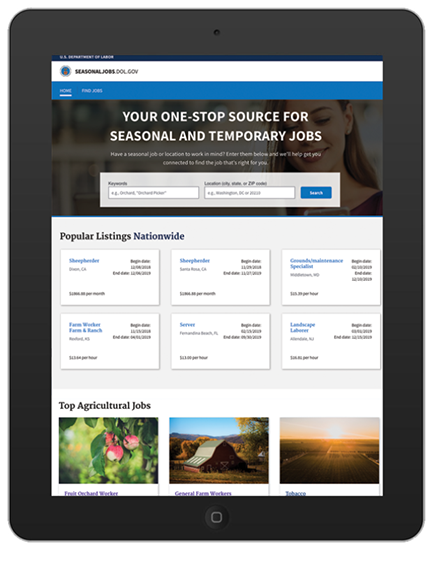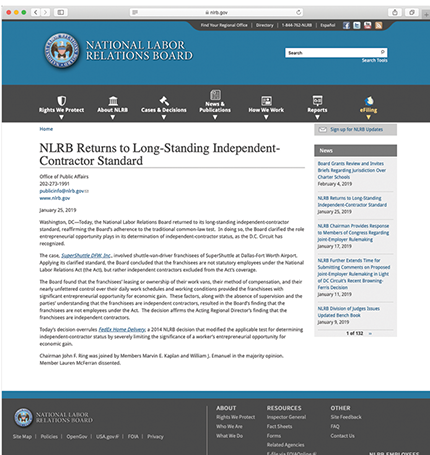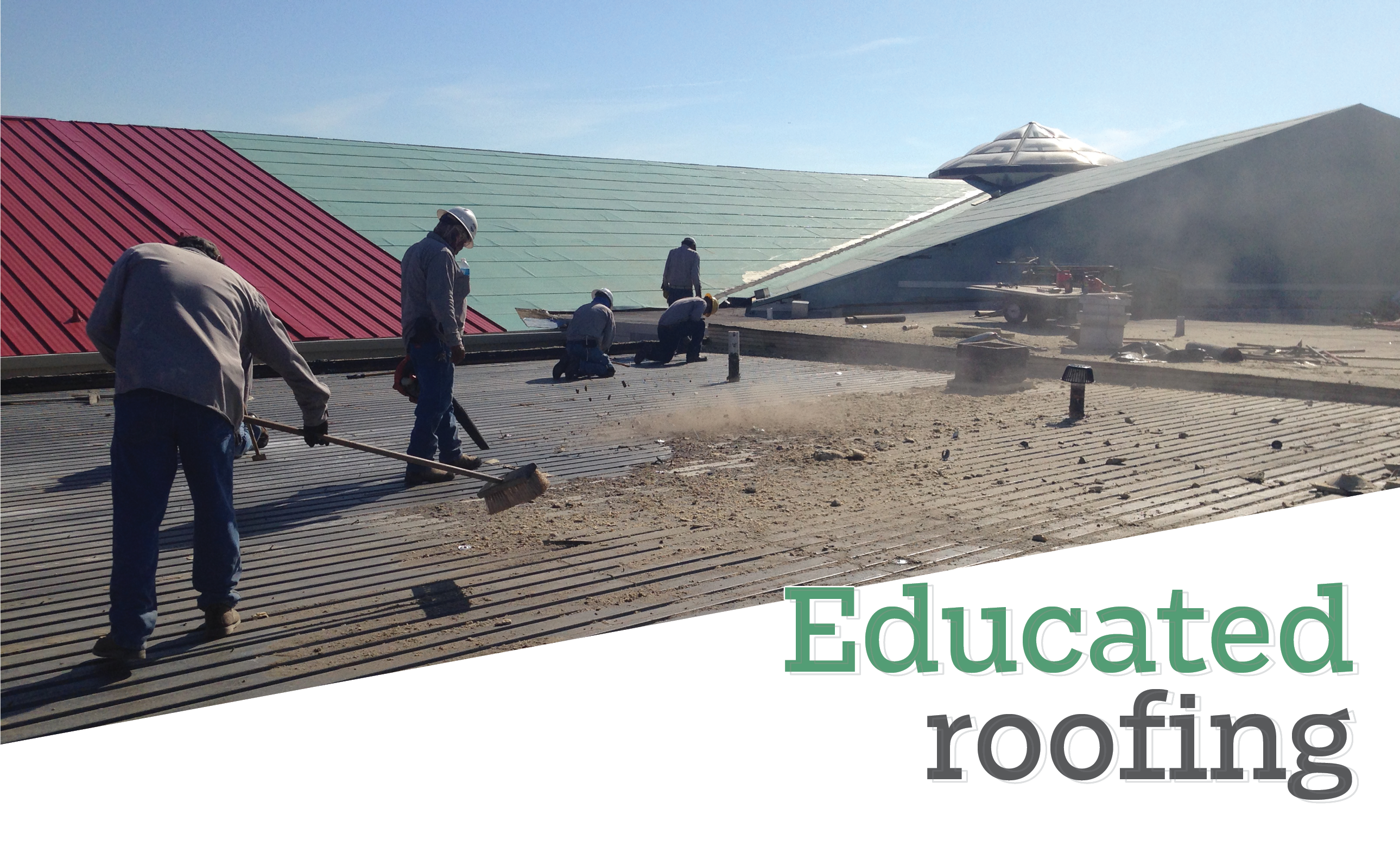DOL job portal for U.S. workers now is available

|
On Dec. 21, 2018, the Department of Labor launched SeasonalJobs.dol.gov, a mobile-friendly job portal for U.S. workers looking for seasonal or temporary work, according to Bloomberg Law.
The portal partly results from rules proposed by DOL and the Department of Homeland Security that would require employers seeking labor certification for low-skilled, seasonal guest workers and agricultural guest workers to post the job openings online for U.S. workers. The H-2A and H-2B visa programs require employers to determine whether U.S workers are available to fill open positions before the employers can be certified to hire foreign workers.
The portal is an overhaul of DOL's Office of Foreign Labor Certification's Public Job Registry and allows job seekers to search by geography and other parameters. It also integrates its employment postings with third-party search websites.
Employers that post jobs now also must include at least two of the following: phone number, email address or website where U.S. workers can apply. The changes also are included in application forms for temporary labor certification and in portal postings.
New NLRB standard boosts companies using contract labor

|
On Jan. 25, the National Labor Relations Board overturned an Obama-era standard for deciding whether workers are employees protected by federal labor law or independent contractors who are not protected, giving a boost to companies that use contract labor, according to Bloomberg Law.
NLRB members said the legal test for employment status properly accounts for workers' "entrepreneurial opportunity" for economic gain, which had been severely limited by a 2014 ruling involving FedEx Corp.
According to the Department of Labor, about 10.6 million workers were independent contractors in 2017—nearly 7 percent of the U.S. workforce. Companies use independent contractors in part to avoid the cost and legal liability involved with employing workers.
The National Labor Relations Act only covers employees, giving them the right to unionize and engage in collective bargaining. Employees also have rights protected by federal law that don't depend on unionization, such as acting together to improve working conditions.
The most recent change stems from a case involving shuttle-van-driver franchisees of SuperShuttle at Dallas-Fort Worth Airport. The NLRB ruled the franchisees are not employees under NLRA and therefore are not covered by the law.
The ruling uses a common-law test from the 1958 version of the Restatement of Agency, a legal treatise that establishes 10 non-exhaustive factors—such as the level of control a business exerts over a worker, method of payment and amount of supervision involved in the job—to determine whether a worker is an independent contractor or employee.
The NLRB says entrepreneurial opportunity always has been at the core of the common-law test for the agency, and the board "can evaluate the common-law factors through the prism of entrepreneurial opportunity when the specific factual circumstances of the case make such an evaluation appropriate." It says the Obama-era board changed the traditional test for independent contractors by downplaying the significance of entrepreneurial opportunity and stressing workers' economic dependency on companies.
NLRB member Lauren McFerran dissented from the ruling, saying her Republican colleagues do not have evidence to support the claim that entrepreneurial opportunity is at the core of the common-law test for the agency. She also says the new standard does not consider the realities of working relationships.
Dow to help lead global alliance to end plastic waste

|
The Dow® Chemical Co., Midland, Mich., is helping lead the formation of the Alliance to End Plastic Waste, a new nonprofit organization of global companies formed to advance solutions that eliminate plastic waste in the environment.
Composed of more than 30 companies from five continents, the Alliance to End Plastic Waste has committed more than $1 billion to develop and scale solutions that manage plastic waste and promote post-use solutions of plastic with a goal of raising $1.5 billion during the next five years.
"Keeping our environment free of waste is important to the future of The Dow Chemical Co. and our industry, but more importantly, it's important to the future of our planet," says Jim Fitterling, CEO of The Dow Chemical Co. "This initiative brings together companies, governments, NGOs and consumers to accelerate efforts to drive innovation, provide much-needed resources and take decisive action to put an end to plastic waste in the environment."
The Alliance to End Plastic Waste will make investments and drive progress in four main areas:
- Infrastructure development to collect and manage waste and increase recycling
- Innovation to advance and scale new technologies that make recycling and recovering plastics easier and create value from all post-use plastics
- Education and engagement of governments, businesses and communities to mobilize action
- Clean up concentrated areas of plastic waste already in the environment, particularly the major conduits of waste, such as rivers, that carry land-based plastic waste to oceans
Additional information about the Alliance to End Plastic Waste and its goals are available at endplasticwaste.org.
PABCO Roofing Products joins NRCA's One Voice initiative
PABCO Roofing Products, Tacoma, Wash., has joined NRCA's One Voice initiative and upgraded its associate membership to "partner member."
The One Voice initiative is a transformational approach to addressing the roofing industry's most critical issues and concerns—with one voice—to secure its future. NRCA invites manufacturers, distributors, architects, engineers, consultants and service providers to fully engage with NRCA, as partners, and actively address the industry's most pressing issues, including workforce and worker certification; effecting change in Washington, D.C.; building codes and insurance; and increasing professionalism in all industry sectors.
For more information about NRCA's One Voice initiative, including a list of the 28 current One Voice partner members, visit www.nrca.net/onevoice.
Violence, heat stress likely to be addressed in 2019
Congress and federal regulators are likely to take action during 2019 to help protect workers from violence and prevent heat stress, according to Bloomberg Law.
With Democrats now in control of the House, workplace safety oversight hearings are expected. Rep. Joe Courtney (D-Conn.) will introduce a bill requiring the Occupational Safety and Health Administration to proceed with regulations protecting health care workers from violence; OSHA also is considering promulgating a workplace violence rule.
Other issues expected to be addressed include developing regulations to protect workers from high-heat hazards; congressional reviews of safety agencies; the Department of Labor's proposal to ease child labor protections in certain industries; a reduction in enforcement activities; efforts to roll back OSHA regulations; the effectiveness of state worker safety programs; and OSHA's effort to remove some provisions of the rules protecting workers from breathing toxic beryllium particles.
The Occupational Safety and Health Review Commission also is expected to play a part in addressing workplace violence and heat stress issues as it decides the circumstances in which OSHA can cite employers for not trying to prevent workplace attacks or fatalities. The commission is handling cases involving an employee who was stabbed while visiting a client and a temporary worker who died from heat stress.
Roofing is the highest-earning trade in the United Kingdom

|
The roofing trade is the highest-earning trade in the United Kingdom, with industry professionals earning an average of 65,213 pounds ($86,059) annually, according to www.simplybusiness.co.uk.
Joiners come in second at 56,386 pounds ($74,410), and electricians come in third at 47,385 pounds ($62,532). Painters reportedly earn the least of the trades, making an average of 28,604 pounds ($37,747) annually; however, location is a factor, with painters in some regions earning more than electricians.
Broken down by region, the highest earners in roofing are from Glasgow, Scotland, making an average of 103,853 pounds ($137,051) annually—148 percent more than roofing professionals in Leeds, England.
Tradespeople in general reportedly are earning much more than they did three years ago. The number of skilled workers earning 100,000 pounds ($131,966) or more has grown by more than 60 percent since 2015.



